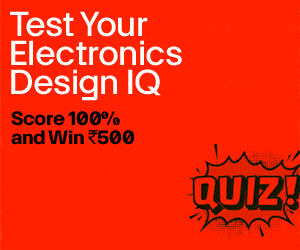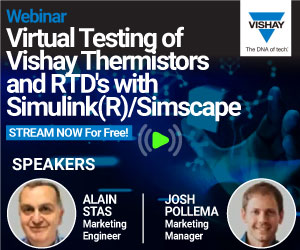VoltServer uses standard data cables and endpoint transformation to efficiently deliver significant power safely across long distances
Global digital transformation is well underway, driven by artificial intelligence, a rapidly maturing 5G wireless network and Internet of Things (IoT) systems that deploy billions of intelligent edge sensors to send real-time data to the cloud. But have you ever stopped to wonder how we will power all of these devices and technologies?
VoltServer, Inc., a manufacturer of power distribution products offers a unique, patented Digital Electricity technology that safely transmits up to 2kW of power across long distances (up to 2km) using low-cost, off-the-shelf data cables.
Harnessing power one pulse at a time
What exactly is Digital Electricity? Digital Electricity is a line powering system, which is a means of energising remote equipment from a centralised location over structured copper cable. Its safely runs high-voltage power over lightweight data cable and delivers low current downstream to power loads. It’s a natively digital form of electricity transmission that can be considered a third power format in addition to the AC and DC formats that were first harnessed nearly 150 years ago.
How does it work? Conventional electricity is broken into small pulses, or “energy packets.” Each packet is sent to a receiver from a transmitter that contains local, embedded processing. Each energy packet is analysed using a digital signal processing engine to determine that power is being precisely and safely distributed. If a fault is detected, the next energy packet is not sent. Each packet contains only a very small amount of energy, so individually they are not harmful to people, animals, systems or buildings. The receiver converts Digital Electricity back into analogue AC or DC to power local loads.
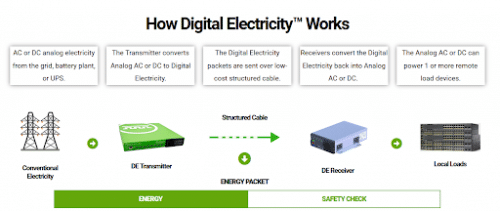
“Imagine a powerful stream of water sent through your plumbing. If a pipe were to burst, the high pressure could injure someone. Instead, break the stream down into millions of droplets,” explained VoltServer co-founder and CEO, Stephen Eaves. “The droplets can be put back together to get the amount of water needed, but each droplet of water is safe. Digital Electricity is similar by only putting a small amount of energy in packets. Each packet becomes safe, but the total power needs can still be met.”
Digital energy enables plug-and-play power sources
Because of its inherently safe energy-transfer design, the VoltServer Digital Electricity platform can send power over a distance up to 2,000 meters using off-the-shelf structured copper communications cable and Class 2, low-voltage wiring methods. It is similar to power-over-ethernet (PoE), enabling transportation of both digital data and power in a single hybrid cabling infrastructure, making it much easier and more economical to install than conventional 110/220 electrical systems.
This simplicity allows architects, designers and facility managers to quickly and easily configure and reconfigure wireless networks, office floorplans and agricultural grow rooms. And because the platform is natively digital, it provides unprecedented insights into energy use with a centralised dashboard. This gives building operators and maintenance staff a granular view of their electric grid to better manage critical loads while eliminating the need for traditional circuit breaker panels.
Power-efficient Vicor converters eliminate need for added cooling
Vicor Corporation has worked closely with VoltServer since they began product development. Vicor ruggedised, passively-cooled BCM DC-DC fixed-ratio bus converters are designed into the receivers transforming the higher transmission voltage to a safe low voltage to power the loads. The 97% power efficiency allows reliable cooling without a fan within a smaller enclosure. They provide the power efficiency that allows the receivers to be placed in tight, enclosed spaces that are too small to accommodate cooling fans. This allows the VoltServer platform to operate more efficiently with much smaller heat sinks and significantly shrinks the receiver footprint.
“With the Vicor converter, we have 43% less heat loss than a normal converter, and the heat sink size decreases proportionately,” said Dan Lowe, VoltServer co-founder and Chief Business Officer. “Our customers include the top three mobile network operators in the U.S., so the requirements for reliability are extremely demanding. That’s where Vicor comes in really, really neatly.”
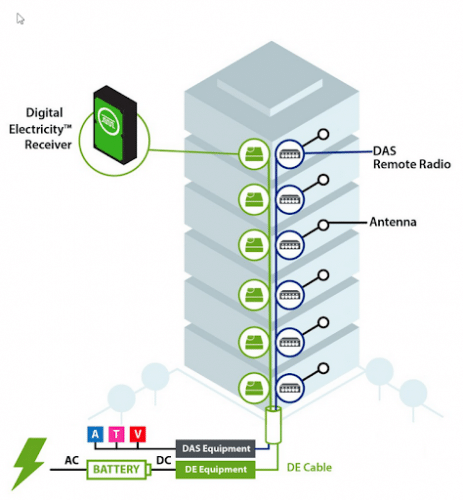
VoltServer uses the Vicor compact BCM6123 fixed-ratio bus converter (0.99 x 2.402 x 0.286in) in the endpoint receivers to efficiently convert the power packets. Vicor BCMs use a proprietary, low-noise, high-efficiency Sine Amplitude Converter (SAC) topology that requires little electromagnetic filtration. This further shrinks the power system footprint and simplifies the design while meeting EMI standards.
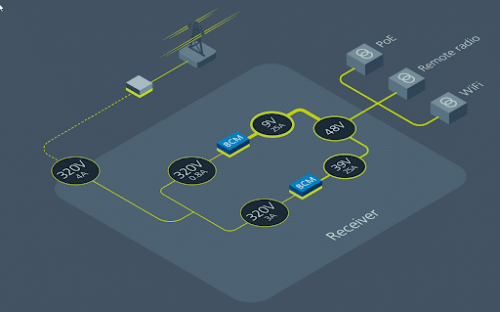
“With so little electromagnetic filtering needed, we can make the Digital Electricity receiver very compact and mount it pretty much anywhere,” Lowe said. “Any other converter would generate more heat. That means that the receiver box would need to be much bigger, require a lot more cooling, and ultimately would cost a lot more and be more difficult to install in space-constrained locations.”
The patented VoltServer Digital Electricity platform distributes electricity in a safe, digital format. The technology is simple to deploy, lower-cost, resilient and proven in large venues with the leading mobile network operators. VoltServer empowers organisations to pursue true digital transformation no matter the complexity or demands of their venue.





